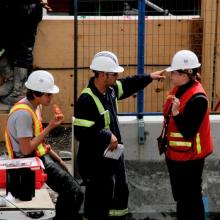Image set

Related services
Related regions
Opening article section
Article section
Lead
Rich text
Why I chose engineering
I chose this field because I’m highly practical and have always really loved math and science. When I started looking at university programs, I knew I wanted a path towards some sort of endgame where I could make a difference.
Many young women who choose to go into engineering have a male family member - father, uncle, grandfather – in the profession. This wasn’t the case for me; my parents just encouraged me to do what inspired me. I went to University of Calgary, which I thought was amazing. It has a very high percentage of women in science because we’re a hub for oil and gas, and there are lots of male engineers with daughters.
My academic journey
I originally thought I would become a chemical engineer, but once at university, I switched into civil engineering. The civil engineering professors were great, and it ended up being one of the most gender-diverse disciplines, with about 25% women. Also, I like when things don’t move – it’s a lot easier to do the math!
In my third year, I did an internship with an office equipment manufacturer here in Calgary. It taught me that I didn’t like project management - a good learning moment. I did get involved in a materials failure project involving an office floor tile used all over the U.S. Through this side project, I became really interested in materials science and materials engineering. So I decided to stay at school and get a Masters in concrete mix design.
Early professional steps
After I graduated, I interviewed at MacIntosh Lalani [a former subsidiary of Englobe] and told them I wanted to run their concrete lab. That was in 2006. My first summer there was incredibly busy. I was doing geotechnical pile inspections in the field and trying to write my thesis. From a personal life perspective, I also got married that year!
Fairly soon after that, I took over the concrete lab, working with the team and doing training, and reviewing processes to make sure we were the best in our market for concrete testing. Over time, I also took over the soils lab and testing, and the asphalt lab and testing – and we did the same process review for those materials too.
Thanks to my passion for engineering and our team’s desire to make a tangible impact in the world, we’ve been able to deliver great results while continuously improving our processes, techniques and approach to projects. Over the years, I’ve gained my team’s and colleagues trust which led to more career opportunities at Englobe.
Following my second maternity leave, I was made Materials Engineering Manager. My responsibilities evolved and I was in charge of all materials testing for our region. A few years later, I was promoted to Director of Operations, Materials for Western Canada.
Engineers: inventors and innovators?
I consider engineers to be innovators in many ways. In my current role, I put a particular focus on innovation in processes and in training. I think it’s mostly because of our desire to do things better than we currently do.
Part of my job is to inspire and empower people to come to me with solutions. To me, it’s about creating a culture where individuals know they can suggest improvements and we’ll actually try them out.
My experience as a woman in engineering
I was a bit concerned about studying in this field, but my experience at the University of Calgary was very positive. I didn’t experience any discrimination while I was studying there. To be honest, I’ve been very fortunate in my career because I haven’t had a lot of negativity. I’ve always taken the perspective that if you’re confident and secure in the knowledge that you deserve to be there and you’re contributing to the project, then these issues usually go away. Also, I’ve always been one to take charge, regardless of my title.
In the workplace, it all comes down to the people in charge and their values. Their attitude usually trickles down into the organization. I’ve been fortunate because there have always been plenty of women here [at Englobe] and there’s no tolerance for bad behaviour.
In the past, I participated in women in engineering mentorship programs through the University of Calgary. I also try to incorporate mentoring in my day-to-day work. I have to say, the students are always my favourites. They’re lovely and fresh-faced, so we try to spend a lot of time with them.
My advice to women contemplating a career in engineering
Remain open to new opportunities as they present themselves, and make sure that you fight for a supportive environment. You want to be somewhere where you feel valued and like you can make a difference. If not, consider making a change because there are lots of places that will value your input and contributions.